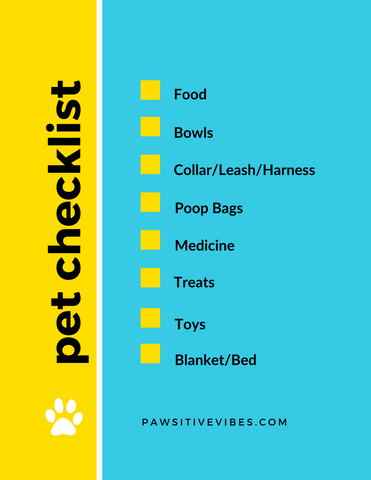Your cart is empty
Looks like you haven't added anything to your cart yet
COVID-19: WHAT EVERY PET PARENT NEEDS TO KNOW

Updated June 16, 2020
It is just us, or are you feeling completely overwhelmed with all this talk of the novel Coronavirus, aka COVID-19?
We’re in the middle of an unprecedented situation and mass panic is setting in as, one by one, countries fall prey to this new virus. New information comes out daily, if not hourly, and government officials are setting rules like we’ve never seen before – closing down air travel, borders and entire school districts; limiting bar and restaurant operations to take out; establishing curfews and setting limits on human interactions through “social distancing”.
There’s been a movement toward working from home, and bread and toilet paper (??!!) is disappearing from shelves, as people prepare for #coronapocolypse. It’s already a scary and confusing time to begin with, but if you have a furry kid to take care of, it can be even more confusing.
So, what’s a concerned pet parent to do? We’re breaking down all the information to ease your mind a bit and make sense of it all. We’ll also give you a few tips on what to do with your furry kids during a shut down so you don’t go completely stir crazy.
What exactly IS COVID -19, aka Coronavirus?
Coronaviruses are a big family of viruses that cause illness in humans and animals. In humans, these range from the common cold to severe diseases like MERS (Middle East Respiratory Syndrome) and SARS (Severe Acute Respiratory Syndrome). In animals, they can manifest as Feline Coronavirus and Canine Coronavirus.
Coronaviruses are “zoonotic”, meaning they’re spread between certain animals and people. Mostly, they circulate between bats, cats and camels. Scientists believe a civet cat was to blame for SARS in Southern China in 2002 and a dromedary (one-hump) camel was responsible for the MERS outbreak in 2012.
In domestic cats, the virus manifests as Feline Coronavirus. Certain strains can cause mild diarrhea, while others can lead to FIP (Feline Infectious Peritonitis), a death sentence for kittens and younger cats. Currently, there’s no cure for FIP, but scientists are hard at work testing an antivirus drug called GC 376. But, as of now it’s still experimental, not very effective and not recommended by the veterinary community.
The news is more optimistic with Canine Coronavirus. This contagious intestinal infection is usually short-lived but can cause a lot of abdominal discomfort for a few days in infected dogs and puppies. Canine coronavirus vaccines are available but are administered based on your dog's lifestyle and risk assessment.
COVID-19 is NEW strain of human coronavirus that was discovered in 2019 and hasn’t been previously identified in humans. What makes it terrifying is that there's currently no vaccine, it spreads quickly (it’s already affected 6 out of 7 continents) and the mortality rate is high.
The World Health Organization (WHO) has classified it as a pandemic. According to WHO, a pandemic is declared when a new disease for which people do not have immunity spreads around the world beyond normal expectations.
In COVID-19 and most human coronaviruses, the most common signs are flu-like: fever, respiratory issues, cough and shortness of breath. The most severe cases can lead to pneumonia, kidney failure and death. Taking precautions to limit exposure can minimize your risk. These include distancing yourself from others and washing your hands frequently.
CAN I GIVE MY PET COVID-19?
Early on in the Covid-19 crisis the answer was no. In June 2020, however, the Center for Disease Control (CDC) indicated that it IS possible for a human to spread the disease to their cats and dogs, based on several worldwide instances.
Best practices to minimize exposure include: not letting your pets interact with people outside the household, and if a person inside the household becomes sick, isolate that person from everyone else, including pets.
CAN MY PET GIVE ME COVID-19 ?
There's currently no evidence to indicate that humans can contract Covid-19 from their pets. However, pets can also serve as a conduit of infection between people. For example, a person with COVID-19 could sneeze or otherwise contaminate their pet, and then another individual could touch that animal and contract the disease.
HOW DO I HANDLE MY PET IF GET COVID-19?
FIRST AND FOREMOST…DON’T PANIC. And while we probably don’t need to tell you this, we’ll do it anyway as a PSA. DO NOT abandon or neglect your pet. Set up your contingency plan RIGHT NOW so you can focus on getting better. Being prepared will ease your mind and ensure the best outcome for you and your pet.
Some things to think about:
- Where will my pets go if I can’t care for them?
In the event that you or a family member contract COVID-19 and can’t take care of your pet, consider asking family or friends to help out. Ask ahead of time and write down clear instructions on feeding, walking and any important details your friends or family need to know (for example: Max always circles three times before pooping). Have a bag with notes and important items packed and ready to g (see our handy checklist). If you have the financial means (and they are open) identify a local daycare and ask about last minute appointments and policies.

- Who can walk my dog if I can’t?
Likewise, identify a friend or family member to walk your dog if you can’t. You can also hire companies like Rover and Wagwalking if they are operating.
- Do I have enough food, supplies, medicine in the event of a city shut down (or hoarders!)
Depending on your city, you may be in for a long haul “social distancing”. Make sure you have enough food, supplies, medicine and toys! Ideally you want a months’ worth of each.
If you DO contract the virus, but are still able to care for your pet in your home, here are some tips for interacting with your pet:
- Keep your distance – no kissing or snuggling (AAAKKK! This is harder than trying not to touch your face!)
- Wear a mask
- Wash your hands before and after touching your furry kids
If you’re stuck at home, and DON’T have COVID-19, here are some things you can do with your pet. If you’re actually working from home, the most important thing you can do is to establish a routine. Your pet is bound to be confused (and happy) that you’re there.
Establishing a routine with boundaries will make the transition easier for both of you. Take your dog out early and walk a little longer so that he/she is tired out. Schedule another walk or playtime during lunch to deal with excess energy. Likewise, schedule playtime with your cat before business hours and during lunch to help reduce excess energy. If you can’t close your home office door, set up a bed and toys near your desk for critical conference calls.
5 THINGS TO DO WITH YOUR DOG AT HOME
|
1. Take your dog to his/her favorite dog park, observing “social distancing” guidelines. |
|
2. Teach your dog a new trick – Give Kiss, Shake Paw and Roll Over are some popular ones that come to mind. Learn how here |
|
3. If you have kids to entertain too, have the kids build a “dog fort” in the living room. |
|
4. Create (or have your kids create) an agility course in the backyard. |
|
5. Play fetch with one of our cute dog toys. |
5 THINGS TO DO WITH YOUR CAT AT HOME
|
1. Teach your cat a trick using “clicker training” Learn how here. |
|
2. Build a DIY house out of a cardboard box |
|
3. Snuggle up on the couch to rewatch some Netflix oldies but goodies. |
|
4. Make a Tik Tok video (BTW - did you know that the internet was invented solely for cat videos?) Check out some of our adorable collars for your videos. |
| 5. Arrange a bunch of items on a counter and take bets on which one your cat will knock down first. |
It’s a scary time to be sure, but with some creativity and preplanning you can ease some of the stress for you and your furry kids. The important thing to remember is that we’ll get through it together, and hopefully learn some important lessons on how to deal with a crisis like this in the future.
We’ll leave you with these 5 step to help stop the spread of coronavirus, courtesy of the World Health Organization and google.
DO THE 5!
- HANDS wash them often
- ELBOW cough into it
- FACE don't touch it
- FEET stay more than 3 feet apart
- FEEL sick? stay home
Article Resources:
Cornell University, College of Veterinary Medicine
World Health Organization (WHO)
Center for Disease Control
sciencemag.org
Additional Reading:
What is Feline Infectious Peritonitis?
What is Canine Coronavirus?
Coronavirus Q & A
- Choosing a selection results in a full page refresh.
